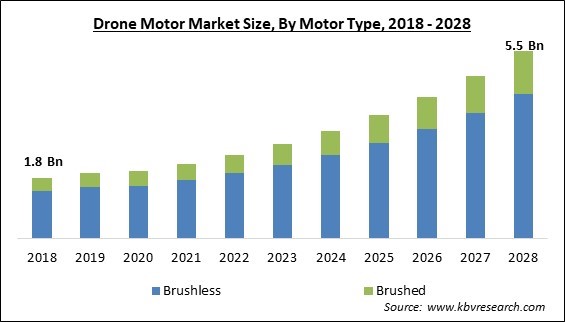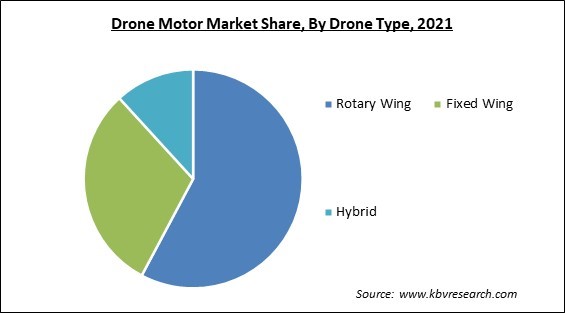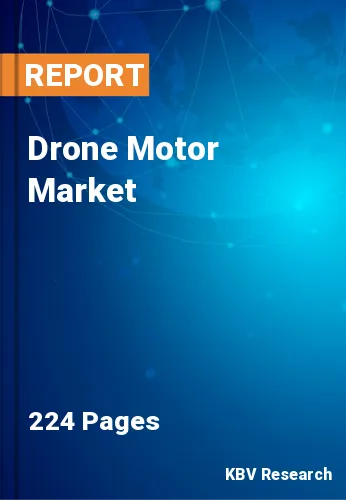The Global Drone Motor Market size is expected to reach $5.5 billion by 2028, rising at a market growth of 14.4% CAGR during the forecast period.
Many businesses, including the military, security, and commercial as well as recreational use of drones, have come to rely on them heavily. The development of drone technology, which has produced more advanced drone motors with better flight abilities, longer flight times, and larger payloads, is credited with expanding the drone business. The engine, which produces the thrust required for lift and maneuverability, is a drone's crucial part.

Drones can now complete more difficult jobs because of the use of sophisticated sensors, cameras, and software. The market for drone motors is anticipated to expand due to developments in drone technology. The drone motor market is anticipated to expand due to the growing amount of money that venture capitalists, private corporations, and governments invest in drone technology. The funding for drone technology is intended to produce more sophisticated drone motors with improved flying characteristics and longer flight periods.
In several nations, there are stringent laws governing drone use. Drone operators must get licenses and permissions, and the restrictions limit the usage of drones in specific locations. Because fixed-wing drones can carry more weight, fly at higher altitudes, or cover greater distances, they will be more in demand in the defense industry due to their usage in modern warfare and construction.
Compared to multi-rotor drones, which have more effective aerodynamic designs, these drones can fly longer. They can cover bigger regions compared to multi-rotor drones because of their greater range and longer flight times, making them a desirable alternative for applications like mapping and surveying that call for comprehensive coverage. They are a suitable option for applications where it is necessary to survey large expanses of land, like agricultural, due to their greater coverage area.
The demand for drone motors rebounded shortly after 2020. During lockdowns in several countries, commercial drones were increasingly utilized for various purposes. Also, they are great for cleaning locations inaccessible to people. Thus, numerous nations have employed agricultural spraying drones loaded with disinfection rather than insecticides to prevent the spread of the disease and clean up public spaces. Hence, demand for drone motors increased shortly after COVID-19's initial outbreak.
Cutting-edge access control and video surveillance technologies have significantly improved the safeguarding of important institutions. Drones are employed in big cities for tactical planning and surveillance of crowds or significant events. During the forecast period, these factors are anticipated to support the expansion of the drone motor market share. Due to ongoing innovation and R&D, the drone industry has grown steadily over the last few years. GNSS, LiDAR, contemporary sensors, infrared imaging systems, and thermal and cutting-edge cameras are all commonly found in drones. This suggests that the drone motor market will grow strongly in the upcoming years.
Drones that can deliver supplies to soldiers wherever they go are being developed by scientists. For example, the U.S. army is constructing a drone dubbed the Joint Tactical Aerial Resupply Vehicle (JTARV) to transport supplies to front-line troops. With the help of cutting-edge long-range communication technology and a freight drop mechanism, Vertical Technologies' DeltaQuad Pro drone can transport cargo across 150 kilometers. Such speedy drone services in military bases are expected to generate prosperous chances for the drone motor market.
De-authentication signals can be sent between access points and equipment that monitor drones to steal drones. This can be accomplished by jamming the scheduled drone frequency using a single-board computer overloaded with hackers' Wi-Fi signals. A Raspberry Pi, a tiny single-board computer, is installed and set up for this by hackers. These drone safety and security concerns may limit their acceptance, which is projected to restrain the growth of the drone motor market throughout the forecast period.
Based on motor type, the drone motor market is segmented into brushless motor, brushed type. In 2021, the brushless motor segment held the highest revenue share in the drone motor market. Because there are no brushes to replace, brushless motors have a longer lifespan. In addition, they have a small structural footprint, much torque, and superior efficiency and speed control. Several elements influence end customers' preference for brushless motors.

On the basis of drone type, the drone motor market is categorized into fixed wing, rotary wing, and hybrid. In 2021, the fixed wing segment witnessed the largest revenue share in the drone motor market. Fixed-wing drones are typically utilized for surveying and mapping. The wings of fixed-wing drones offer more stability and consume less power due to their aerodynamic form. The popularity of fixed-wing drones will grow as the construction sector expands in emerging nations around the globe.
By power capacity, the drone motor market is divided into below 50 W, 51 to 100 W and above 100 W. In 2021, the above 100 W segment dominated the drone motor market with maximum revenue share. These motors are utilized for UAVs (unmanned aerial vehicles) that must carry bigger payloads, like LiDAR scanners or bulkier sensors, or transport substantial amounts of cargo. They give the necessary high levels of power for these heavier takeoff weights.
Based on application, the drone motor market is bifurcated into agriculture, construction, military, entertainment and others. In 2021, the entertainment segment acquired a substantial revenue share in the drone motor market. Photographers are rapidly using drones to gain a competitive advantage, and drones are gradually becoming a must for professional photography. Small drone cameras that can capture high-quality photographs are being developed by companies such as DJI for professional photographers.
| Report Attribute | Details |
|---|---|
| Market size value in 2021 | USD 2.2 Billion |
| Market size forecast in 2028 | USD 5.5 Billion |
| Base Year | 2021 |
| Historical Period | 2018 to 2020 |
| Forecast Period | 2022 to 2028 |
| Revenue Growth Rate | CAGR of 14.4% from 2022 to 2028 |
| Number of Pages | 224 |
| Number of Table | 450 |
| Report coverage | Market Trends, Revenue Estimation and Forecast, Segmentation Analysis, Regional and Country Breakdown, Companies Strategic Developments, Company Profiling |
| Segments covered | Motor Type, Drone Type, Power Type, Application, Region |
| Country scope | US, Canada, Mexico, Germany, UK, France, Russia, Spain, Italy, China, Japan, India, South Korea, Singapore, Malaysia, Brazil, Argentina, UAE, Saudi Arabia, South Africa, Nigeria |
| Growth Drivers |
|
| Restraints |
|
Region wise, the drone motor market is analyzed across North America, Europe, Asia Pacific and LAMEA. In 2021, the North America region led the drone motor market by generating the highest revenue share. Using drones for espionage and surveillance purposes in the United States is driving the expansion of the market for drone motors. In addition, the use of drones in the construction industry is on the rise as American regulations mandate that construction companies do routine site inspections. As a result, enterprises are embracing drone motors to inspect locations, which has contributed to the market's rapid expansion.
Free Valuable Insights: Global Drone Motor Market size to reach USD 5.5 Billion by 2028
The market research report covers the analysis of key stake holders of the market. Key companies profiled in the report include Dr. Fritz Faulhaber GmbH & Co. KG, Nidec Corporation, Constar Micromotor Co., Ltd., Changzhou Fulling Motor Co., Ltd, KDE Direct, LLC, TAMAGAWA SEIKI Co.,Ltd., Jiangxi MAD motor components co., ltd, Neutronics Enterprises, Inc., Tiger Motor International Co., Ltd, and X-TEAM.
By Motor Type
By Drone Type
By Power Type
By Application
By Geography
The global Drone Motor Market size is expected to reach $5.5 billion by 2028.
Rising demand for enhanced surveillance are driving the market in coming years, however, Safety & Security Issues with UAVs restraints the growth of the market.
Dr. Fritz Faulhaber GmbH & Co. KG, Nidec Corporation, Constar Micromotor Co., Ltd., Changzhou Fulling Motor Co., Ltd, KDE Direct, LLC, TAMAGAWA SEIKI Co.,Ltd., Jiangxi MAD motor components co., ltd, Neutronics Enterprises, Inc., Tiger Motor International Co., Ltd, and X-TEAM.
The Military segment acquired maximum revenue share in the Global Drone Motor Market by Application in 2021 thereby, achieving a market value of $2.1 billion by 2028.
The Rotary Wing segment is leading the Global Drone Motor Market by Drone Type in 2021 thereby, achieving a market value of $3.1 billion by 2028.
The North America market dominated the Global Drone Motor Market by Region in 2021, and would continue to be a dominant market till 2028; thereby, achieving a market value of $2 billion by 2028.
Our team of dedicated experts can provide you with attractive expansion opportunities for your business.

